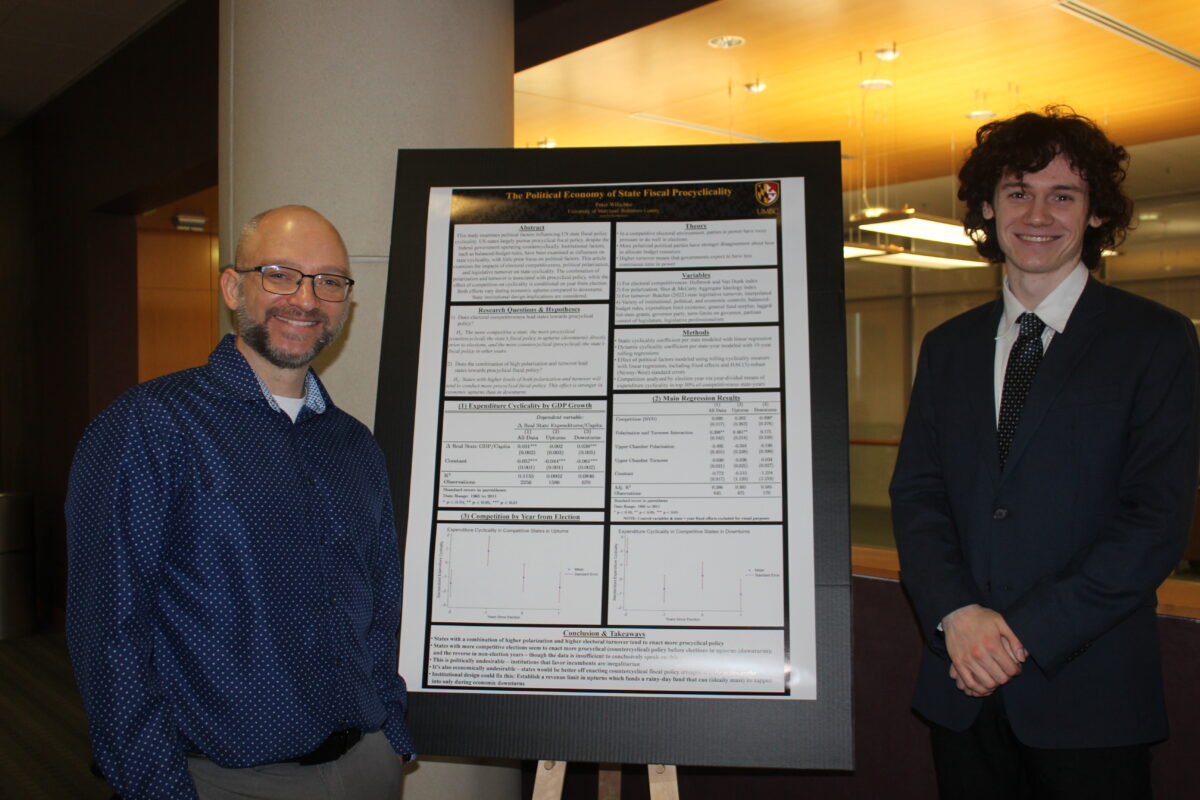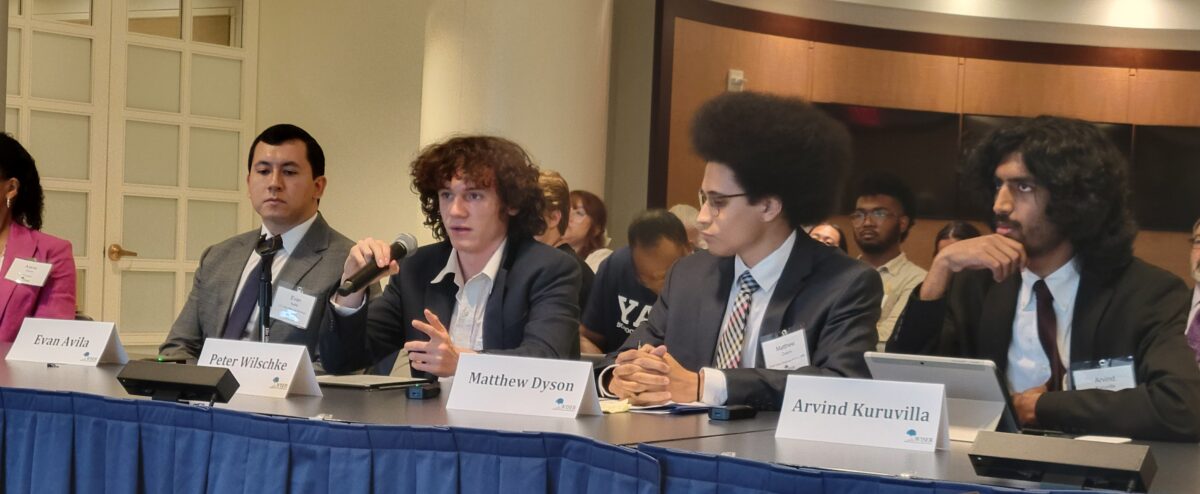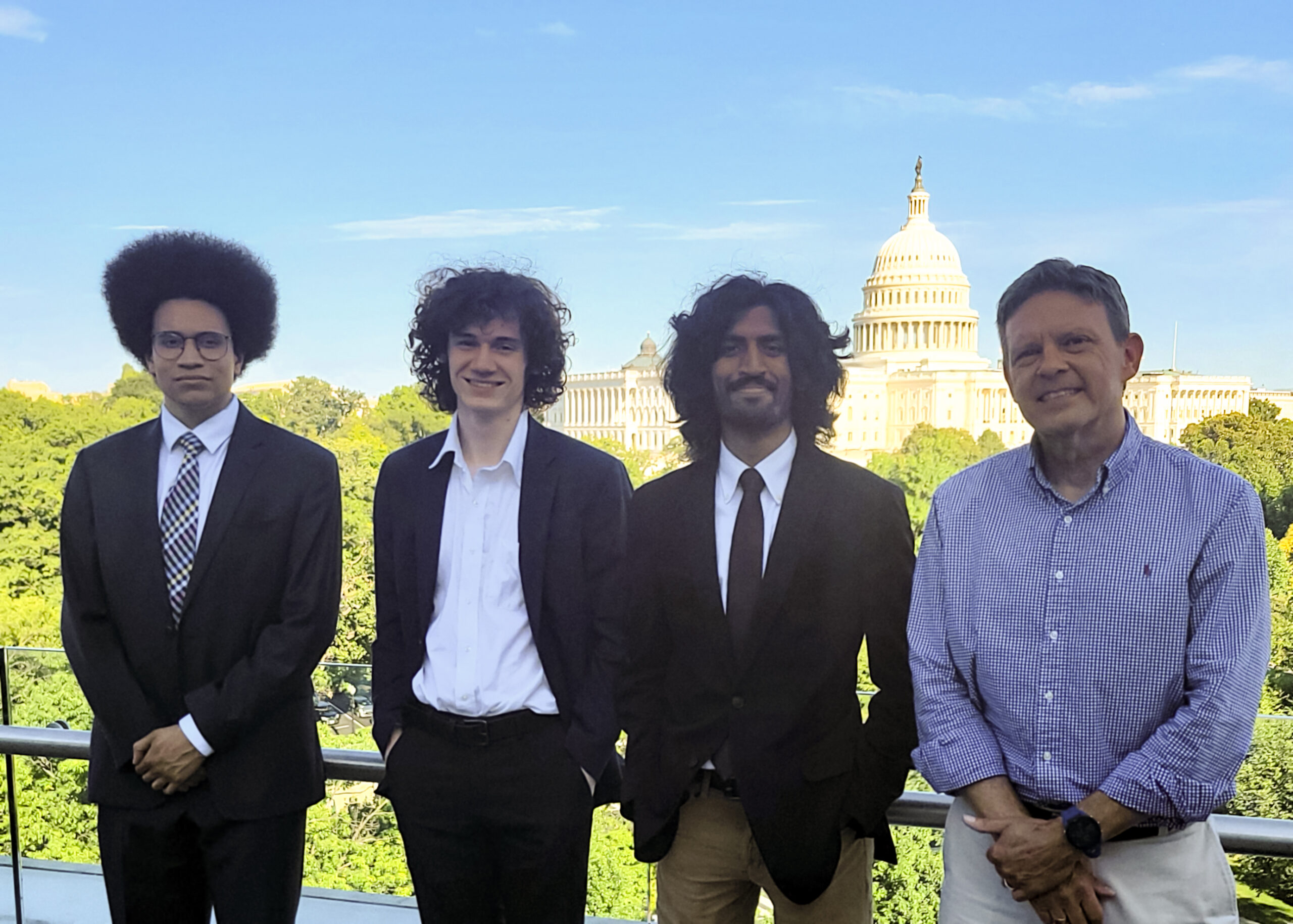Peter Wilschke ’24, economics and political science, hit the ground running after graduation in May, beginning a two-year research assistant position at the Federal Reserve Board of Governors in Washington, D.C. He is working on the quarterly Z.1, a report on the financial assets and liabilities, transactions, and balance sheets for households, nonprofit organizations, and businesses. Additionally, Wilschke assists economists with research projects. For Wilschke, these tasks are a welcome set of challenges—he thrives on long-term projects that combine both his majors and allow him a level of independence he nurtured successfully at UMBC.
Just weeks before graduating, Wilschke’s article “Political Drivers of State Fiscal Cyclicality” was accepted for publication in the State and Local Government Review, the official journal of the Section on Intergovernmental Administration and Management of the American Society for Public Administration. Wilschke published as the sole author, which is rare for an undergraduate researcher.
A few weeks after graduation, Wilschke was celebrating again. This time, with his teammates Arvind Kuruvilla ’25, financial economics and philosophy, and Matthew Dyson ’25, political science and computer science. Their paper, “Improving American Retirement Prospects: Policy Solutions for the Financially Fragile,” was one of two winning submissions chosen by the Women’s Institute for a Secure Retirement (WISER) 2024 iOme (I Owe Me) Challenge national student competition. It was the first time in the 20 years since the challenge was established that two teams held the winning title. UMBC’s trio of undergraduates proudly shared the spotlight with the Johns Hopkins Carey School of Business graduate student team.
While these accomplishments came one right after another, Wilschke has been successfully merging his two passions—political science and economics—for some time.
“Once you take statistical analysis and research methods classes in economics or political science, your world is open to how empirical research is actually conducted in those fields. I would not have known where to start without these classes,” says Wilschke, the 24th recipient of the Pittman Family Scholarship, established in 2006 by Kenneth Pittman ’79, economics, and Patricia Pittman ’78, political science, who shared Wilschke’s majors.
“Peter’s accomplishments and that of his colleagues at UMBC are very impressive,” says Kenneth Pittman.“Congratulations to everyone on the iOme team!”
With a little help from my mentors
His desire to see the impact of policy for the long haul keeps Wilschke open to inspiration. A couple of years ago, Wilschke attended the economic department’s Mullen Lecture, presented by Carlos A. Vegh, the Fred H. Sanderson professor of international economics at Johns Hopkins University. Vegh discussed his research on how fiscal policy is conducted over the business cycle in developing and developed countries. What intrigued Wilschke was how developed countries contract their fiscal policy when the economy is doing well and expand fiscal policy during an economic downturn while developing countries do the exact opposite. He wondered if individual states reflected similar cycles and, if so, whether other factors influenced the expansion and contraction of fiscal policy.
“I explored whether and how political factors—political polarization, turnover, and electoral competition—work to explain why some U.S. states tend to spend more in good times and less in bad times, unlike the federal government,” says Wilschke, who presented the paper at UMBC’s 2024 Undergraduate Research and Creative Achievement Day.
This was Wilschke’s first time leading a research project. “I didn’t quite know what I was getting myself into,” says Wilschke. He shared the idea with Carolyn Forestiere, professor of political science and his professor of research methods, and she connected him with Eric Stokan.

Stokan, associate professor of political science and now Wilschke’s mentor, says he enjoyed working with Wilschke weekly for over two semesters, which helped him think through all aspects of the work. He taught Wilschke R, a statistical computing and data visualization programming language. Stokan also suggested pieces of literature on the topic, which helped Wilschke think through the operationalization of his variables and analytic specifications and framing policy.
“For each session, I would consistently say, ‘Okay, your next step should be X,’ and he would have done X, Y, and Z,” says Stokan. “It was amazing. Peter learned R more quickly than anyone I have ever met.” Wilschke adds, “It was very helpful to have a mentor who had gone through this process multiple times before.”
“Eric and I encouraged Peter to submit his work to a professional journal,” says Forestiere. “We figured that it would be a learning experience even if it were rejected.” They were all delighted when the journal—which only accepts about 14 percent of submissions—asked Wilschke to revise and resubmit. “We were ecstatic when it was finally accepted for publication!”
WISER choices
Doug Lamdin, professor of economics, mentored Wilschke, Kuruvilla, and Dyson to the finish line of the WISER iOme Challenge. The competition raises awareness among university students about the impact of retirement security on society’s social and economic well-being. Students nationwide respond to the annual iOme Challenge question with a policy paper. This year, students were asked to imagine that Congress named them to an independent commission on retirement, with instructions to re-evaluate and modernize the retirement system from the perspective of Gen Zers (those born between 1997 and 2012).
“I put the team together,” says Wilschke. “I knew Matthew from classes and volunteering at UMBC’s Volunteer Income Tax Assistance club, and Arvind was a co-worker of mine in the Admissions Office. It was a lot of fun to work with them and much easier with three people than it would have been by myself.”

Lamdin has ushered four iOme winning teams through the process, starting in 2018 with Evan Avila ’18, economics and political science, now a financial analyst at the Securities and Exchange Commission. Avila has served as a co-moderator for the iOme winner’s presentation for the last two years. Lamdin’s mentoring approach—based on guiding mentees toward independence—has stayed consistent since he first mentored Avila. Lamdin assists them in developing a timeline for producing the essay by the due date that aligns with the judging criteria and provides students with background reading materials. From there, Lamdin steps back, trusting the team to work independently, with weekly check-ins to monitor their progress and provide feedback on their drafts.
Lamdin notes that Wilschke was proactive and professional. He appreciated his ability to find relevant research, interpret data, and consider new possible retirement policies.
“It is a rewarding experience for the students and me, so I hope to continue doing it,” says Lamdin. “I have never had a team I mentored not win, so maybe I will stop doing this when the winning streak ends—kidding, sort of.”
Motivation to follow a hunch
While Wilschke was conducting his research for his papers, he was also interning at The Hilltop Institute at UMBC, a nonpartisan research organization dedicated to improving the health and well-being of people and communities. He worked for Morgan Henderson, principal data scientist and affiliate professor of economics, and Morgane Mouslim, policy analyst, on a research project funded by the National Science Foundation on hospital pricing transparency. His two-year internship entailed helping to organize data collected from hundreds of hospitals and writing a news brief, “The Impact of Market Concentration on Hospital Pricing,” and presenting it at URCAD 2024.
“Peter is an excellent researcher who helped our hospital price transparency project significantly over the past two years,” says Henderson. “The quality of his work is top-notch—we predict that he’ll go far.”
Wilschke did not plan on contributing empirical research to the field of political science as an undergraduate student. Looking back, he is grateful for the classes and opportunities UMBC afforded him that prepared him to follow a hunch. Wilschke said that he felt that some students don’t look forward to statistical analysis or research methods classes in economics or political science because they’ve heard the classes can be difficult and may appear irrelevant at the moment.
“Most of what I accomplished as an undergrad was something I had to decide I wanted to do without having anyone to tell me I should do it,” explains Wilschke. “I’ve learned how far I can go if I try everything I can think of. It gives me motivation and a little bit of pressure to keep up that level of work throughout my time at the Fed Reserve and, hopefully, in grad school.”
Tags: CAHSS, CAHSS_research, COEIT, Computer science, Economics, Philosophy, PoliticalScience, Research

